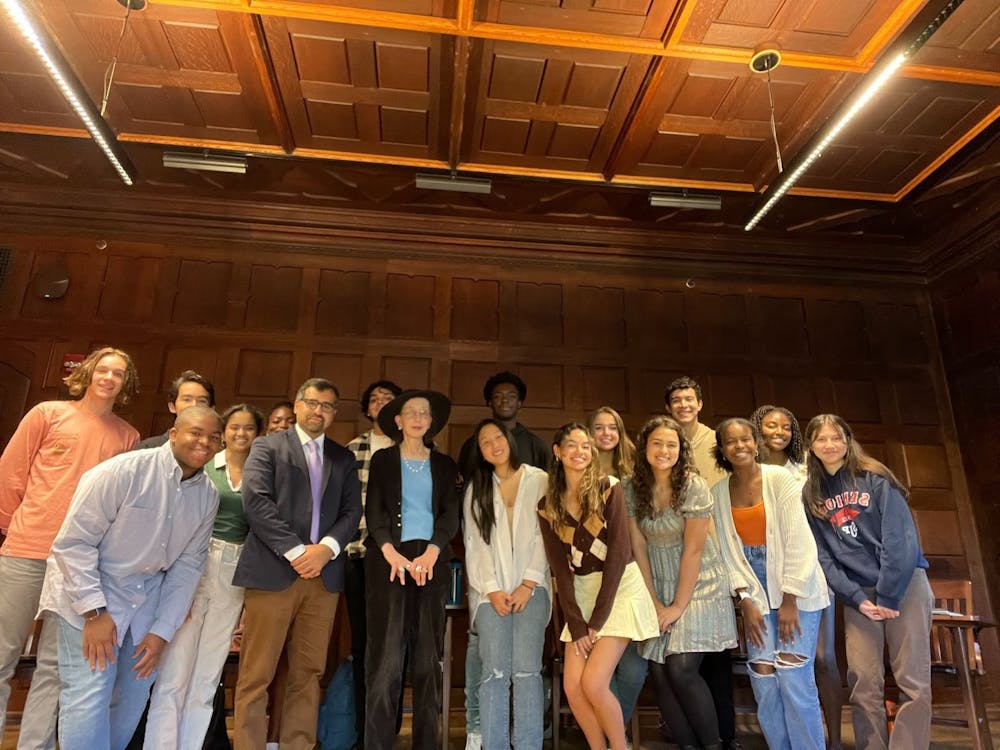National Book Award Winner, five-time Pulitzer Prize finalist, and creative writing professor Joyce Carol Oates made a guest appearance during my freshman seminar, FRS105: American Identity at a Crossroads, taught by Dr. Nasser Hussain. During the class, she discussed her fictional biography “Blonde” and collection of essays “On Boxing.”
Her visit came on the heels of controversy regarding the Netflix adaptation of “Blonde.” The film saw widespread condemnation, as “the latest necrophiliac entertainment to exploit” Marilyn Monroe, as Manohla Dargis reviewed in The New York Times. It has been under fire for its depictions of sexual assault and abortion, as well as for highlighting the trauma that Monroe endured throughout her career instead of her successes, such as her Golden Globe wins in 1954, 1960, and 1962.
Planned Parenthood called out the film for bolstering the views of “anti-abortion zealots [that] have long contributed to abortion stigma by using medically inaccurate descriptions of fetuses and pregnancy,” and reviewers have called the movie “an exercise in exploitation.”
Though Oates described the film “Blonde”as “a brilliant work of cinematic art,” she added as a disclaimer that it is “not for everyone.”
And it certainly isn’t, if the online reviews are any indication.
However, instead of focusing on the controversy surrounding the film, Oates mainly discussed her love of boxing during the class visit — unsurprisingly, since the class had been assigned to read her collection of essays “On Boxing.”
Sharing her encounters with Mike Tyson and Muhammad Ali, she explained that the way they acted in private was very different from the public personas they put on. Aside from these interactions with famous boxers, she said she fell in love with the sport because it has “a great respect for the past.”
At the same time, she called out the sport for its shortcomings, saying, “Boxers and some other people, they’re exploited, they’re very badly exploited. For decades and decades, boxers had no protection.”

As Oates continued to speak and answer more questions posed by students, many within the class also came to a general understanding on how boxing’s history could provide greater significance to understanding the current race and gender roles in America.
Oates then connected the exploitation of boxers to that of the film industry and the career of Marilyn Monroe, saying “[Tyson] wasn't then protected and Marilyn Monroe wasn't protected at all.”
During the discussion, Oates mentioned that film crews would sometimes inject performers, including Monroe, with medication to give them more energy. It was these injections that led to the addiction that may have caused the Hollywood icon’s 1962 passing, which, from Oates’ point of view, was “no fault of her own.”
While the cultures surrounding Hollywood and boxing have changed significantly in recent decades, exploitation in the arts and sports continues to pose significant concerns, particularly with the rise of child actors and athletes. This issue is evident in the “former child star gone rogue” narrative or in doping scandals that involve underaged athletes.

Much of Oates’ work has become bigger than just herself, and she embraces that. Oates spoke with passion, encouraging people not to intellectualize, but rather just to observe what is happening and live in the present. Through her appearance, I saw her incredible ability to connect and relate with her audience, as she was able to connect with me.
As Oates’ visit drew to a conclusion, and as I continue to ponder her visit weeks later, I can’t help but see Oates as a woman who, throughout her acclaimed career, has used her experiences and her writing to always go deeper. This is especially evident when it comes to bringing awareness to the exploitation that has long pervaded the entertainment industry, industries like it, and how such exploitation lingers to this day.
“Blonde” the film was released on Netflix on Sept. 16.
Justus Wilhoit is a News contributor for the ‘Prince.’ Please direct any corrections requests to corrections@dailyprincetonian.com.








